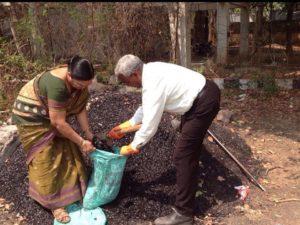“When a 70 year old person is able to fill a pothole in hours, why is the government failing, especially when they spend hundreds of crores of rupees on other issues?” asks Gangadhara Tilak Katnam. “How is the helmet going to help when there is a pothole,” he wonders.
It has been nine years and counting since January 2011. At the last count on January 3 2019, 1359 potholes have been filled. “I used to keep a tally in my diary, but then my son helped me feed it on to social media, and that recording continues,” he says.
Clearly, this man here is on a mission. Born in a farmer’s family in Yernagudem village of West Godavari district, he eventually became an urban citizen and led an ordinary life as senior section engineer of the Southern Railways. He travels occasionally to the US, to spend time with his son Ravikiran and his family. Sarala, his daughter lives in Hyderabad.

This was only to be followed by several such incidents at various other places. Thus started Katnam’s journey, to help people live in a `pothole-free’ city.
A unique journey
The complaints to authorities did not help, but death brought urgency to Katnam’s life. “An RTC bus hit an auto from behind, killing one person on the spot. I realised that this accident had taken place because of an unrepaired pothole and thought that had someone filled the pothole, a life could have been saved,” says Katnam.
It soon became an obsession with him, to repair potholes. And so he would stop the car the moment he saw a pothole and fill it up with broken tar which he had collected from various places. But soon there were more potholes to be filled and less time to fill them and his lunchtime was now entirely devoted to shramadaan.
As the work became overwhelming, he quit his job and took to full time fixing roads. “This worried my wife because I was on the road all the time and not eating my lunch. So she called my son to come and counsel me,” he says now with a smile.
His wife Venkateswari also smiles and says, “I was merely worried about his health.”
The son came, saw and was conquered by what his father was doing. He, in fact, stayed a little longer and decided to help his father and created a website and a Facebook page for Katnam’s cause calling it `Shramadaan’, with a helpline for people to call and inform about potholes in various locations.
Whatever is wrong with our roads?
The basic flaw he feels is in quality. An engineer himself, he points out that for any civil construction work, including in roads and buildings, there are specifications to be followed. If there is compliance with these, then there should be no problem, but there is no proper check.
Second is the design of the road, which should ideally be straight. In Hyderabad, however, curves on the roads make it difficult. Though open land is available, the government has not been able to acquire it. “The only reason I can think of is political influence. These curves on the roads lead to accidents,” Katnam points out.
The third problem lies in lack of coordination, where some department is building roads while another department comes along, digs it up and leaves it without properly laying the road.
“A proper road would cost the exchequer close to Rs 1 crore per kilometre, and it would be a tragedy if another department came and broke it up soon after it was done. I would place the entire responsibility at the door of the R&B, PWD departments, the NHAI (National Highway Authority of India) and the GHMC (Greater Hyderabad Municipal Corporation). This is not the first time I am saying it, but they have no intentions of laying a perfect road,” says the Pothole doctor.
He also cites an interesting example: “I go to this particular barber shop. He has a systematic way of giving a shave, which is to first use cream and then a razor. In other words the barber knows the sequence of operations. No university has trained these barbers, but they know that no work should be left half done, or be done through an unnecessarily repetitive process.
But in the road building scenario, the sequence of operation is totally missed. They build an expensive road and then break it, because there is no prior coordination between departments. That is why these days I tell all officers in these departments to spend two days at the barber shop to learn the value of sequential working.”
But there are other factors leading to our cratered roads.
“To ensure good roads in cities, towns and villages, the waste water coming out of houses, complexes, restaurants should be prevented from being let out on to roads and stagnating there. That is the main cause for potholes. You have to stop the stagnation of water first. Here, the municipality fills potholes during the rains, which is a blunder. November to January is the time to fill potholes, but they never do it at that time. They should also concentrate on the overflowing drains, but they do not control those either,” says Katnam. “Accidents due to potholes is an universal problem,” he says and adds that though the solution is easy, it is also costly and only a government can do it by implementing certain procedures.
“I want the government to take prompt action because potholes are very dangerous. In Hyderabad, GHMC is utilizing 30 trucks of BT mix material daily to fill the potholes. If transparency is maintained about the daily movement and utilization of these 30 trucks, there won’t be any potholes on the roads. Other cities and towns may be having a similar problem; if only we can enforce transparency in pothole filling, we can save thousands of crores of rupees nation-wide and can ensure pothole-free roads.”
He adds that there is also serious need for a change in mindset among the general public.
Can such efforts last?
Can individual action by citizens following in Katnam’s footsteps really help solve the pothole problem of roads in Hyderabad, or anywhere else for that matter?
“I tried to meet the CM K Chandrasekhara Rao and his son K T Rama Rao, hoping that the state government would help me take the project forward, but it is next to impossible to get an appointment. I have been covered extensively by the world media and different states in our country are trying to do what I am doing, so surely they know who I am. But yet they do not give me an appointment,” Katnam says.
He also shares that when Somesh Kumar was the Municipal Commissioner in 2014, he had promised to fill all the potholes and pay in cash if there was any complaint about an unfilled pothole. However, he never went through with it.
Katnam now wants to sustain this programme till it reaches the ear of the right politician. No pressure groups have been formed to take the message to the right person or press for action. According to him, large population is an asset provided every individual does his part and contributes to the betterment of the nation.
“I continuously advise college students and organisations to do their bit, whenever I am called to deliver a lecture. Government authorities, however, do not call me for any seminar or lecture, where I can talk about my experiences and save crores of money for them. I am only talking from experience and can give and demonstrate simple, feasible solutions.”

Even if the government has not responded with enthusiasm, civil society certainly has.
Software engineers, college students, local villagers, vegetable vendors, hand cart pullers, IPS officers — people from all walks volunteer to help him out. His work has been discussed in various countries including Japan, Germany, Pakistan, Bangladesh, Belgium, Vietnam and at a seminar on road safety in London.
“Youngsters keep trying to contact me but I do not announce where I am going because too many people come, causing danger to all concerned,” confides Katnam. His photo and details of his work have appeared in two calendars and he has delivered a TED Talk in Mumbai. In 2015, superstar Amitabh Bachchan gifted him with a Maruthi Alto 800 car!
So, what is behind the success of his initiative? Hyderabad’s pothole man has a simple answer. “I have filled holes in the roads because I do not want anyone to die because of an accident caused by pothole. That is my intention. Whether it is a success or not, only time will tell. ‘We can make a change’ is our motto and we fill up potholes in Hyderabad every Saturday.”
Katnam is aware of three individuals/groups who are working in a similar manner in other cities, including Pothole Raja of Bengaluru (Pratap Bheemsena), Dadarao Bilhore of Mumbai and the Pothole Warriors of Mumbai.
“The public and the government are both responsible for good roads,” he says.
And the journey continues…
Today, the backseat of Katnam’s car always has a few gunny bags full of tar mixed gravel, mostly collected from roadsides. When he is unable to find dumped gravel on the roadside, he buys it from contractors by spending from his own pocket. Such is the felt need to make Hyderabad roads safer for commuters. Having started his venture with five bags at a time, Katnam’s car now carries eight to ten such bags, which are emptied whenever a pothole is spotted.
This has, of course, come at a considerable cost — materially and otherwise. The Greater Hyderabad Municipal Corporation (GHMC) initially tried to dissuade him from carrying out repair work on his own, but eventually stepped in to help. “I used to spend Rs 25,000 per month but after the GHMC started providing material, I only spend around Rs 15,000 of my total pension of Rs 20,000 pension. My son takes care of my household financial needs,” says Katnam.
After attending a class in Stanford College on philanthropy, the retired engineer decided not to take any donations or any kind of cash contribution from people. “There are lakhs of NGOs who have been accused of misusing funds raised. I believe I must do what I can with friends and relatives. We need intention and not power or money to do what is necessary. I have intention and a will to deliver, and that I am doing.”
But there are other sacrifices involved. “I like to dress well, but I am just about managing to make ends meet. We have an ancestral home at my village shared by five brothers, but I am using up all my savings on filling up potholes in Hyderabad instead of repairing that house which is also decaying,” he says. But then that is precisely the message that he wants to send out: In order to have a safer and nicer world to live in, sacrifice is essential.
- TIPS FOR FILLING A POTHOLE
There are two ways to do it: one, using BT hot mix and two, with BT cold mix. - Cold mix is very expensive and four times the cost of hot mix, but very good for filling pot holes. It is also easier to carry to any location.
- There should be no water stagnation and if there is some, then it has to be arrested first.
- The potholes have to be cleared of all debris before beginning the filling process. #KhabarLive
